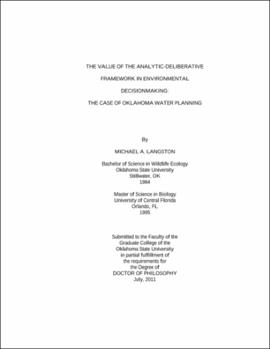| dc.contributor.advisor | Focht, Will | |
| dc.contributor.author | Langston, Michael A. | |
| dc.date.accessioned | 2013-11-26T08:29:49Z | |
| dc.date.available | 2013-11-26T08:29:49Z | |
| dc.date.issued | 2011-07 | |
| dc.identifier.uri | https://hdl.handle.net/11244/7108 | |
| dc.description.abstract | Scope and Method of Study: This study investigates the relationship between the level (robustness) of public participation and the social acceptability of policy recommendations that emanate from environmental decision-making processes. In particular, the study investigates the ability of analytic-deliberative processes to increase social acceptability of watershed planning recommendations over those generated in processes that employ less robust participation processes such as consultation. Three statewide comprehensive water-planning efforts and two regional planning efforts in Oklahoma, USA, were included in this study. Robustness of participation processes were judged using Sherry Arnstein's ladder of public participation. Social acceptability of plan recommendations was judged by elites familiar with water planning and public preferences across the State. Their judgments were validated by comparison to large random sample surveys of citizens in two of the five planning efforts. Analysis of the relationship between participation robustness and recommendation acceptability was conducted for individual recommendations and categories of similar recommendations. | |
| dc.description.abstract | Findings and Conclusions: Elite judgments compared favorably with those obtained directly from citizens in the two random sample telephone studies, which indicate that their judgments could be used as a proxy for public preferences - although elite judgments proved to be somewhat more pessimistic. A weak but statistically significant positive relationship between the level of public participation and recommendation acceptability was found. In particular, a positive relationship was found between plans that involved no public participation and those that involved at least some. The relationship was strongest for those recommendations that were more salient, controversial, and populist (seen by citizens as appropriate for public discourse). A model developed by Will Focht can be used to explain this relationship as the outcome of trust judgments: citizens prefer to be more involved when both government and social trust are lower and facts are less certain. | |
| dc.format | application/pdf | |
| dc.language | en_US | |
| dc.rights | Copyright is held by the author who has granted the Oklahoma State University Library the non-exclusive right to share this material in its institutional repository. Contact Digital Library Services at lib-dls@okstate.edu or 405-744-9161 for the permission policy on the use, reproduction or distribution of this material. | |
| dc.title | Value of the analytic-deliberative framework in environmental decisionmaking: The case of Oklahoma water planning | |
| dc.contributor.committeeMember | Caneday, Lowell | |
| dc.contributor.committeeMember | Shriver, Thomas E. | |
| dc.contributor.committeeMember | Engle, David M. | |
| osu.filename | Langston_okstate_0664D_11684.pdf | |
| osu.accesstype | Open Access | |
| dc.type.genre | Dissertation | |
| dc.type.material | Text | |
| thesis.degree.discipline | Environmental Science | |
| thesis.degree.grantor | Oklahoma State University | |
